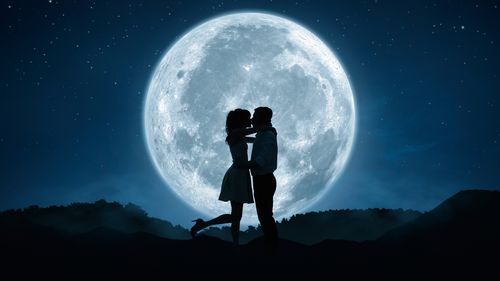<div class="block-content"><div class="styles__Container-sc-1ylecsg-0 goULFa"><span>A new study that analyses how kissing evolved suggests that ape ancestors and early humans like Neanderthals probably locked lips with their friends and sexual partners. The behaviour may date back 21 million years.</span></div></div><div class="block-content"><div class="styles__Container-sc-1ylecsg-0 goULFa"><span>Humanity's earliest kisses were recorded 4500 years ago in Mesopotamia and Ancient Egypt, but Matilda Brindle, lead author of the research and an evolutionary biologist at Oxford's Department of Biology, said kissing presents an "evolutionary conundrum".</span></div></div><div class="block-content"><div class="styles__Container-sc-1ylecsg-0 goULFa"><span>It appears to carry high risks, such as disease transmission, while offering no obvious reproductive or survival advantage, she said.</span></div></div><div><div id="adspot-mobile-medium"></div></div><div class="block-content"><div class="styles__Container-sc-1ylecsg-0 goULFa"><strong><span>READ MORE: </span></strong><a href="https://www.9news.com.au/national/brisbane-police-crime/e64de6e6-c8e7-4782-ae4e-8fb664dd4f11"><strong><span>Almost 100 crimes leads to bizarre discovery</span></strong></a></div></div><div class="block-content"><div class="styles__Container-sc-1ylecsg-0 goULFa"><span>"Kissing is one of these things that we were just really interested in understanding," Brindle, who studies sexual behaviour in primates, told CNN. </span></div></div><div class="block-content"><div class="styles__Container-sc-1ylecsg-0 goULFa"><span>"It's pervasive across animals, which gives you a hint that it might be an evolved trait."</span></div></div><div class="block-content"><div class="styles__Container-sc-1ylecsg-0 goULFa"><span>Kissing, which the team defined as non-aggressive, mouth-to-mouth contact that doesn't involve food, isn't something that can be detected in the fossil record, so Brindle and her colleagues used a different approach.</span></div></div><div><div class="OUTBRAIN" data-reactroot="" data-src="//www.9news.com.au/world/a-new-analysis-suggests-kissing-on-the-lips-may-have-evolved-21-million-years-ago/f9722e65-1be0-4b57-916d-f760a9db869c" data-widget-id="AR_5"></div></div><div class="block-content"><div class="styles__Container-sc-1ylecsg-0 goULFa"><span>From existing scientific literature, the researchers collected information on which modern primate species have been observed kissing; these included chimpanzees, bonobos, orangutans and one species of gorilla.</span></div></div><div class="block-content"><div class="styles__Container-sc-1ylecsg-0 goULFa"><span>The team then ran a phylogenetic analysis, which allows scientists to infer information about traits in extinct species based on behavioural data from living animals. It involves reconstructing a tree or map of how different primate species are related based on genetic information, Brindle explained.</span></div></div><div class="block-content"><div class="styles__Container-sc-1ylecsg-0 goULFa"><span>"With that information, we can kind of travel back through time," she said.</span></div></div><div class="block-content"><div class="styles__Container-sc-1ylecsg-0 goULFa"><strong><span>READ MORE: </span></strong><a href="https://www.9news.com.au/national/hannah-mcguire-killer-lachlan-young-mum-debbie-statement/2781e34e-90ac-4d1a-9fa1-76e504298d6e"><strong><span>Murdered woman's mum reveals what court barred her from saying</span></strong></a></div></div><div class="block-content"><div class="styles__Container-sc-1ylecsg-0 goULFa"><h3><strong><span>Prehistoric kisses</span></strong></h3></div></div><div class="block-content"><div class="styles__Container-sc-1ylecsg-0 goULFa"><span>The team deployed statistical modelling to simulate different evolutionary scenarios along the branches of the tree to estimate the probability that different ape ancestors kissed. </span></div></div><div class="block-content"><div class="styles__Container-sc-1ylecsg-0 goULFa"><span>For example, she said chimpanzees, bonobos and humans all kiss, so it's likely that the last shared ancestor of all those species did, too. To give robust estimates, the model was run 10 million times.</span></div></div><div class="block-content"><div class="styles__Container-sc-1ylecsg-0 goULFa"><span>The results, published Wednesday in the journal </span><em><span>Evolution and Human Behaviour</span></em><span>, suggested that kissing is an ancient trait in the large apes, evolving in an ancestor of that group between 21.5 million and 16.9 million years ago.</span></div></div><div class="block-content"><div class="styles__Container-sc-1ylecsg-0 goULFa"><span>This means that extinct human relatives, such as Neanderthals, were likely to have engaged in kissing, too. It's also possible — since scientists know that our species, Homo sapiens, interbred with Neanderthals — that humans and Neanderthals kissed one another, the study noted.</span></div></div><div class="block-content"><div class="styles__Container-sc-1ylecsg-0 goULFa"><strong><span>READ MORE: </span></strong><a href="https://www.9news.com.au/national/australia-wont-host-cop31/78427091-dc31-400d-a012-8f75a0690cda" rel="" target="" title=""><strong><span>Australia loses out in bid to host crucial $1 billion conference</span></strong></a></div></div><div class="block-content"><div class="styles__Container-sc-1ylecsg-0 goULFa"><span>However, the model does not reveal why or how kissing evolved, Brindle said, noting that there are multiple uses, including assessing potential mates, foreplay, bonding, mitigating social tension, and chewing food before giving it to offspring.</span></div></div><div class="block-content"><div class="styles__Container-sc-1ylecsg-0 goULFa"><span>She added there is limited data on kissing in animals outside of ape species, making it difficult to reconstruct how the trait may have developed over time. What's more, much of the information came from animals living in captivity or sanctuaries. Additional data on kissing in different species is needed, she said.</span></div></div><div class="block-content"><div class="styles__Container-sc-1ylecsg-0 goULFa"><span>"What we've done, which is a really important first step, is showing it's an evolved trait," Brindle said. </span></div></div><div class="block-content"><div class="styles__Container-sc-1ylecsg-0 goULFa"><span>"It's really ancient. But why? And that's the amazing next step if people want to pick up the mantle."</span></div></div><div class="block-content"><div class="styles__Container-sc-1ylecsg-0 goULFa"><span>Kissing is not a universal behaviour in human society, the researchers noted in the new study. It is only documented in 46 per cent of cultures, according to a 2015 paper.</span></div></div><div class="block-content"><div class="styles__Container-sc-1ylecsg-0 goULFa"><span>"We did find a strong evolutionary signal in kissing but it doesn't mean it has to be retained," Brindle explained. </span></div></div><div class="block-content"><div class="styles__Container-sc-1ylecsg-0 goULFa"><span>For some populations, she added, kissing might not be a good fit.</span></div></div><div class="block-content"><div class="styles__Container-sc-1ylecsg-0 goULFa"><span>"Primates are extremely flexible species, very intelligent, and so kissing might be useful in some contexts but not in others," she said. </span></div></div><div class="block-content"><div class="styles__Container-sc-1ylecsg-0 goULFa"><span>"And if it's not useful, it is quite risky with high potential for disease transfer."</span></div></div><div class="block-content"><div class="styles__Container-sc-1ylecsg-0 goULFa"><span>Kissing is more than just "mouth-to-mouth" touching, and the study doesn't really shed much light on why humans kiss the way they do, said Adriano Reis e Lameira, an evolutionary psychologist and primatologist at the University of Warwick, who was not involved in the work.</span></div></div><div class="block-content"><div class="styles__Container-sc-1ylecsg-0 goULFa"><span>"The large majority of kisses humans give are not mouth-to-mouth," he said via email.</span></div></div><div class="block-content"><div class="styles__Container-sc-1ylecsg-0 goULFa"><em></em><a href="https://www.9news.com.au/national/how-to-follow-9news-digital/29855bb1-ad3d-4c38-bc25-3cb52af1216f"><em><strong><span>DOWNLOAD THE 9NEWS APP</span></strong></em></a><em><strong><span>: Stay across all the latest in breaking news, sport, politics and the weather via our news app and get notifications sent straight to your smartphone. Available on the </span></strong></em><a href="https://apps.apple.com/au/app/9news/id1010533727"><em><strong><span>Apple App Store</span></strong></em></a><em><strong><span> and </span></strong></em><a href="https://play.google.com/store/apps/details?id=nineNewsAlerts.nine.com&hl=en_AU&pli=1"><em><strong><span>Google Play</span></strong></em></a><em><strong><span>.</span></strong></em></div></div>
The 'evolutionary conundrum' of kissing may be way older than you think

Leave A Reply
Your email address will not be published.*